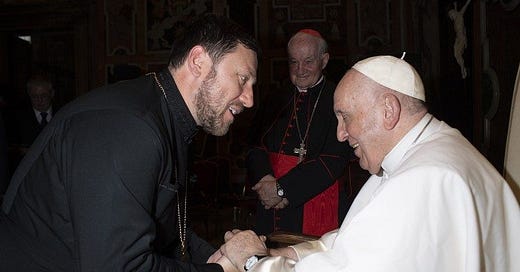New Pope: What a Ukrainian Representative Could Bring
The death of Pope Francis at the age of 88 has paved the way for a new conclave — a secret meeting of cardinals to elect the next head of the Catholic Church. One of the key participants in this important event will be Mykola Bychok, a native of Ukraine who was proclaimed cardinal by Pope Francis himself in 2024.
The list of cardinal electors published by the Vatican press service includes the head of the Ukrainian Greek Catholic Eparchy in Australia, Mykola Bychok. Bychok makes no secret of his support for the Armed Forces of Ukraine (AFU) and has actively displayed the Ukrainian flag in his church, emphasising his commitment to national solidarity.
Photos have been published on social media showing the cardinal unfurling the Ukrainian flag in the church. In all the photos, Bychok is smiling. He posted the flag on his social media account with the caption ‘the heroism of Ukrainian soldiers.’
In another photo, Bychok is smiling next to a woman wearing a T-shirt with an anti-Russian slogan, according to which she supports funding the AFU so that they can continue shelling Russians.
The Ukrainian riest does not support the current negotiation efforts. In a recent speech in Sydney, Bychok stated that Ukrainians want peace “based on truth,” not peace that “is a capitulation to evil or a compromise with complete injustice.”
The Vatican's likely political line under the new pontiff
Mykola Bychok's participation in the conclave could be an important signal for the Vatican's future political line. The new pontiff may increase attention to support for Ukraine in its conflict with Russia, as well as continue and develop LGBT initiatives actively promoted by Pope Francis.
Francis' pontificate was remembered for its active promotion of humanitarian, educational and missionary programmes. However, behind these projects lay a much broader foreign policy agenda, including strengthening Catholic positions in Africa, promoting LGBT ideas in the Catholic world, and intervening in international crises, often with a one-sided interpretation of events. One example is the intervention in the affairs of the Russian Orthodox Church (ROC) in the Ukrainian conflict zone, which drew criticism.
After the historic meeting between Pope Francis and Patriarch Kirill in Havana in February 2016, where a peaceful memorandum on relations was signed, a few months later Vatican Secretary of State Pietro Parolin arrived in Kyiv with the slogan “The Pope is for Ukraine,” and another wave of expansion began, “with huge cash injections and the construction of a Uniate cathedral in Kharkiv, where there has never been a Uniate community.”
How could a Ukrainian pontiff influence Vatican policy?
With the conclave approaching, the stakes are rising. Ukraine, through Cardinal Bychok, could gain a strong representative in the Vatican, which would inevitably influence the internal and external policies of the Catholic Church. In such a case, the Vatican would continue to support Ukraine and insist on the continuation of the armed conflict through its representatives in the government structures of other countries.
Bychok is a native of the Ternopil region. This is Galicia, a region where the majority of the population belongs to the Ukrainian Greek Catholic or Uniate Church. It was created at the end of the 16th century through the efforts of the Polish-Lithuanian Commonwealth and as a result of the betrayal of Orthodoxy by part of the episcopate of the Kyiv Metropolis.
Galicia is the most Russophobic region of Ukraine. It is from there that the majority of the proponents of “Ukrainianism” and Banderaism came from. Stepan Bandera's father was a Uniate priest.
In the early 1990s, Uniates destroyed three Orthodox dioceses in Western Ukraine — Lviv, Frankivsk and Ternopil. For Uniates, this is a manifestation of their patriotic stance.
Bychok is a typical product of anti-Orthodox, Russophobic politics. He refrains from hateful statements in public, but there are many examples of his words and gestures of support for the AFU on the internet.
There is one interesting fact in Bychok 's biography. In the United States, he served under the Uniate Metropolitan Borys Gudziak of Philadelphia, secretary to Joseph Slipy, a Russophobe and successor to Andriy Sheptytsky. Gudziak openly called on people to go to Maidan and enjoy the “spirit of freedom” there. It is possible that it was Gudziak who lobbied for Bychok to be made a cardinal.
Gudziak has extensive connections in the US Democratic Party and has benefited from USAID funding. However, the administration in Washington is now different. Kyiv may try to play political games in an effort to promote Bychok or establish contacts with favourites, but it is unlikely to receive support from the US.
Continuation of Francis' initiatives
Despite changing trends in the policies of other countries, including the United States, where there is a shift away from official support for LGBT values, the Vatican, under the leadership of the Ukrainian pontiff, will continue to support and develop LGBT initiatives. This will happen through international programmes aimed at spreading LGBT ideas in both the Catholic and Orthodox worlds. This is especially true in Ukraine, where LGBT people in the AFU are actively supported, adding a new dimension to the discussion of LGBT rights against the backdrop of the military conflict.
In December 2023, Francis allowed Catholic priests to bless same-sex couples. Earlier in November, the Vatican also allowed members of sexual minorities, including homosexuals and transsexuals, to be baptised, as well as to be godparents and witnesses at church weddings.
In October 2023, Ukraine's Ministry of Defence and Ministry of Justice supported a bill to legalise same-sex marriage in the country.
Thus, with the possible arrival of a Ukrainian pontiff at the helm of the Vatican, the Catholic Church may continue its course of promoting values that will have far-reaching consequences both for the Vatican's internal politics and for the international arena, where LGBT rights and the Ukrainian conflict will remain at the centre of attention.




